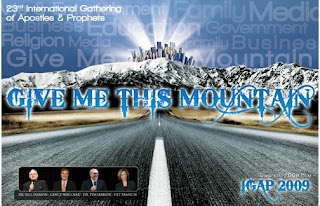C. Peter Wagner’s “Theology”
On December 7, 2011 C. Peter Wagner, head of the New Apostolic Reformation, issued an “Addendum”[1] to his previous statement in an e-mail issued from his “Global Spheres” entity, titled “NAR – What are its beliefs?” (11-20-11).[2] Wagner says that he released this Addendum because he “received responses from friends (not critics, mind you) that suggested the Global Spheres statement was incomplete because it omitted certain doctrinal issues that the respondents felt were primary.” He then posits his own definition of theology:
The remainder of Wagner’s letter is an exercise in postmodern thinking. Wagner defines theology as a human endeavor that is “always susceptible to flaws.” He provides a one-paragraph superficial history of the Council of Nicea. And then he launches into one of his favorite topics, the Lausanne Congress of 1974, which issued a “Covenant” that gave the modern evangelical church a secondary mandate to that of preaching the Gospel, which was social action. This social action gospel has now become, for Wagner and others, the theological opening for Dominionism. Wagner concludes his little dissertation on theology with a paragraph from one of his books:
Wagner’s “Ground Rules for Theology”
In his 1996 book Confronting the Powers,[3] Wagner challenges orthodox theology and its ground rules. On page 41 he offers the same humanistic definition of theology as he quotes in his Addendum: “Theology is a human attempt to explain God’s word and God’s works in a reasonable and systematic way.” Wagner explaines:
To agree with Wagner’s definition of theology, then, means that one must agree that it is a human thing, not a God thing. As soon as one agrees with this basis for theology, then all else becomes shifting sand, open to revision or new revelation, evolving, subject to human whims and nature, and no longer absolute. Wagner has just played a postmodern mindgame with his readers. If they agree to his ground rules and definition, they have just agreed that doctrinal truth is human and therefore not absolute, and that “theology” (i.e., doctrine) is therefore subject to evolving semantic understandings. Theology/doctrine has just been divorced from Biblical Truth and put it into the esoteric/existential realm. This is the essence of postmodernism.
And this is precisely what Wagner has done throughout his entire life. He has opened traditional orthodoxy to new words, new understandings, new doctrines, new practices, new eschatologies, and new gospels.[4] For example, in his 1988 book The Third Wave of the Holy Spirit[5] Wagner admits that he obtained his doctrines about spiritual warfare from extra-biblical sources outside of the Canon of Scripture. He cites the apocryphal Acts of Peter where he says there were highly vivid descriptions of “a spiritual ‘shootout’” and “confrontational theatrics” in the forum, and the apocryphal Acts of John where there was a “power encounter… in the temple of the goddess Artemis” resulting in it splitting in pieces “and half of the whole temple” falling down. (pp. 80-81). He says that including such extra-biblical supernatural stories can be “used to bring people to conversion to Christianity.” (p. 82)
Wagner also based his life work on man-made methods for evangelism. His evangelism became mixed with the social gospel. Therefore he believes that man-centered humanistic methods of changing worldview will achieve results for his social action gospel. In fact, Wagner was one of the poster boys for Leadership Network[6] while he was developing his New Apostolic Reformation network in the 1990s. Wagner wrote in his 1983 book On the Crest of the Wave[7] that:
The ultra-pragmatic Leadership Network spawned not only the New Apostolic Reformation but also the Emergent movement,[8] both of which also contain an intrinsic mystical component that drives this new postmodern theological paradigm forward. To do this, biblical theology must be deconstructed and discarded. Wagner has just shown us how he did it.
The Truth:
Brother David W. Cloud in his Way of Life Encyclopedia[9] explains the term “doctrine” in the context of the whole postmodern worldview. His comments are excerpted below:
Endnotes:
1. “THE NEW APOSTOLIC REFORMATION: What Are Its Beliefs? ADDENDUM,” by C. Peter Wagner (12-6-11), http://campaign.r20.constantcontact.com/render?llr=iscjkybab&v=001cQDW1aEI0uUrmgn_6zBlChlZkrQIikk_6MMTLQcaBMxQmstAOPx5gn_Flq0e9ARd15EXeZ0iyaUg6LlMF6Xyaj-TUWp9Z-fz8GZyPbeJLfj4rmjX6nDphA%3D%3D
2. See previous Herescope for details, https://herescope.net/2011/12/spiritual-warfare-eschatology.html
3. C. Peter Wagner, Confronting the Powers: How the New Testament Church Experienced the POwer of Strategic-Level Spiritual Warfare (Regal, 1996).
4. See, for example, “The Agenda & Teaching Of The New Apostolic Reformation, transcript of C. Peter Wagner, Arise Prophetic Conference, Gateway Church, San Jose, CA, 10-10-2004, with forward by Sandy Simpson, 5/23/05,” http://www.deceptioninthechurch.com/arise.html. Also see: https://herescope.net/2005/11/c-peter-wagner-concocts-another-new.html where Wagner is quoted as saying, “It seems that God is constantly moving us into new times and seasons. He is pouring out new wine, and we are trying to keep up by developing as many new wineskins as we can.” (Freedom from the Religious Spirit. Also see http://www.deceptioninthechurch.com/wagnerquotes.html “C. Peter Wagner – Quotes & Notes
compiled by Sandy Simpson & Mike Oppenheimer.”
5. C. Peter Wagner, The Third Wave of the Holy Spirit (Vine Books, 1998).
6. See Herescope posts: https://herescope.net/2011/08/c-peter-wagner-spins-nar.html and https://herescope.net/2011/09/documenting-dominionism.html and https://herescope.net/2011/08/denying-dominionism.html
7. C. Peter Wagner, On the Crest of the Wave: Becoming A World Christian (Regal, 1983).
8. See this post at Apprising Ministries for comprehensive documentation and details: http://apprising.org/2009/07/10/herescope-the-emerging-church—circa-1970/
9. Brother David Cloud, Way of Life Encyclopedia (Way of Life Literature, 2002), “Doctrine” entry, pp. 160-161. Some of this entry is reproduced here: http://www.biblebelievers.net/Doctrine/kjcdoct1.htm
* This is illustrative of the new theologies of C. Peter Wagner. “Give Me This Mountain” With Bill Hamon, Lance Wallnau, Tim Hamon, Pat Francis and More! October 20-23, 2009 — Santa Rosa Beach, FL. Paid Advertisement on The Elijah List issued Jul 18, 2009, http://www.elijahlist.com/words/display_word_pf.html?ID=7826. Click to enlarge this exhibit. The purpose was billed as:
“Give Me This Mountain!”
Join us as we hear revelation on our next level in God from seasoned apostles and prophets! Possess your promised inheritance in government, family, business, education, arts & entertainment, media and religion.

